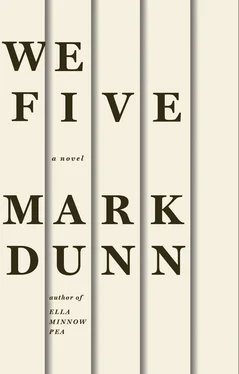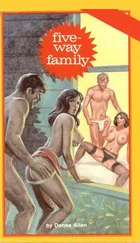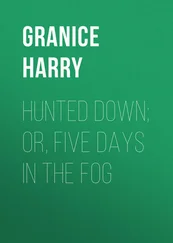And Rose Sowell was much abused. In the time it took Big Jim to hear her cry for help and then race up the stairs to her room (with Minerva following close behind), Will had taken the opportunity to clabber up the girl’s painted face with his pummeling fist and to change the hue of various parts of her pink chubby flesh to red and black and a species of blue-green not often seen imprinted upon human epidermis.
Under his threat of tossing Will down the stairs, Big Jim kept Will on ice until the cops arrived — specifically the two cops with whom Minerva had a special relationship. (They were both on the take.)
“I’m afraid that things got just a little out of hand,” said Rose in answer to one of the officers’ questions. Ordinarily this particular officer liked to conduct his interview with one of his hands roving absently about the female victim’s smooth, conveniently exposed thighs, but for this interview, in deference to the severity of Rose’s injuries, he kept his paws to himself.
“I worried that things might go in this direction,” said Minerva, tossing a regretful look at Will, who was now sitting handcuffed and wild-eyed upon Rose’s quilted vanity chair in the corner of the room.
“Why didn’t you tell me?” Rose painfully groaned.
“Oh, I really should have. Here, darling. Take another aspirin.”
London, England, October 1940
“Is the professor sick?” asked Molly, sawing a piece of her stewed steak.
“Not sick, really,” replied Bella. “Just a little knocked up.” Bella, playing to the hilt the role of hostess to her six impromptu dinner guests, passed a serving plate of currant rolls to Maggie, who was seated next to her. “I barbitoned him, you see. The poor thing hasn’t slept for the last two nights, so I thought I’d give him a few good winks before the sirens go off again.”
Ruth spooned up more new potatoes for her plate. “You take very good care of your new husband. You’re taking good care of us, as well. Bella, you’ve become quite the mother hen in your premature old age.”
Bella laughed. “I get lots of help. Mrs. Hood from next door cooked most of this feast. I wanted to give all of you one thumping good meal before you head off to points unknown. Of course they’re known to you , but I’d rather you not tell me in case the police drop by and start asking questions. I can certainly lie if I have to, but it’s so much nicer if I don’t have to.”
Jane cocked her head, listening. “He’s snoring.”
“I’m so glad,” replied Bella. “My poor sweet Reggie. He’s thinking about taking a leave of absence from the college. Since the physics lab copped it last month, he’s had to teach out of the gardener’s potting shed. Not that he’s got that many students these days — so many have dropped out to enlist — but he says it’s still hard to do anything on the two or three hours of sleep he gets at night and with groundskeepers and gardeners popping in and out during his lectures and rattling pots.”
Carrie reached across the table and touched the hand of her friend and former next-door neighbour. “Considering what the professor’s been going through, you’re both very kind to let us stay here tonight.”
“You’re most welcome. But I seriously doubt you’ll get to spend the whole night here. Since there isn’t room for all of us in the shelter out back, I’m afraid that once that siren starts screaming, I’ll have to send the whole lot of you off to the tube station.” Bella smiled. “ Although… there have been some interesting rumours flying about lately — that the Nazis are deliberately avoiding this neighbourhood on Hitler’s special instructions. They say he adores Du Cane Court and wants to use that whole block to house his SS officers after the inva—”
The words of Bella’s explanation trailed off because Carrie had turned away from her in the middle of them. Bella bit her lip.
“I’m so sorry, love. I wasn’t thinking.”
Carrie spoke without looking at Bella. “Or maybe you just thought the incendiary that ended my mother’s life was a Nazi mistake .”
“That isn’t what I — all I’m saying is that some of our neighbours here in Elmfield Road do believe this, and so they don’t bother to take shelter. That’s all I’m saying.”
Carrie nodded. She turned back to her friend and said, softening, “I know you meant no harm.” She tried to smile. “Maybe it isn’t Art Deco Hitler likes. Maybe it’s all those music hall singers and dancers who live there. Sometimes I walk along the High Road and I can hear them carrying on inside. I know what it’s like to lose oneself in music — to forget there’s even a war going on. To forget everything that eats you up from the inside.”
Maggie touched Carrie tenderly on the shoulder. “Like the night we went to the Palais and you were carried a million miles away.”
Carrie laughed mordantly. “By a man who probably should have been sitting in a prison cell.”
Bella considered Carrie for a moment before speaking. “Carrie, you haven’t sworn off men altogether, have you?”
Jane laughed. “Oh, I don’t think you have to worry about that .” At that moment Lyle returned from his trip to the lav, and all the women sitting at the dining room table, save Carrie, burst into laughter. Lyle looked at them speculatively and then checked his flies.
“No, brother, we aren’t laughing at you ,” said Jane, and then quickly correcting herself: “Well, of course we are. But not in a bad way.”
Lyle, still looking befuddled, sat down next to Carrie just as Professor Prowse padded sleepily into the room from his early evening nap. “I thought I smelt Mrs. Hood’s vegetable soup. Is there any left?”
“Pull up a chair, Reggie,” said Bella, going to her drowsy-eyed husband to smooth back his bed-mussed hair. “I’ll fetch you a bowl. You know all the girls. You don’t know Lyle. He’s Jane’s brother. Lyle’s a fugitive from justice. These chums of mine from childhood are his abettors.”
The professor and Lyle shook hands. “You’ll be pleased to know, Mr. Higgins, that I —” The professor interrupted himself to cough away some accumulated phlegm from his throat. “—am a moral relativist. Whatever you did, you had your reason for doing it, and it isn’t my place to judge.” The professor yawned. “Are those Mrs. Hood’s currant rolls? What did we do to deserve that woman’s cornucopian generosity?” Assuming there’d be no answer to his potentially rhetorical question, Prowse bit off the end of one of the rolls and continued, “At times of communal crisis, members of society are forced by circumstances to do one or more of the following things, and you’ll usually see all of them employed in varying measure. One: ‘Extend, amend, or bend.’ The rules, that is. The rules of societal and civil engagement. Exempli gratia: Michelle Hood extending her wonted liberality to bounteous excess. Elsewhere, female factory workers and Land Girls being permitted to wear trousers. Cooks replacing butter with marg.”
“But certainly not by choice!” pronounced Ruth. Everyone laughed.
The professor quickly reclaimed the floor: “A chap puts on a uniform and suddenly he’s given license to kill. Or rather, to follow the ‘amend and bend’ model, the soldier has been provided a ‘justification’ for murder. By definition, it’s still murder, but we fix a wartime rider to the rule to extenuate the consequences.
“Two. ‘Break the rules entirely.’ Both sides in this war have done their share of that. They’ve broken confirmed promises not to bomb civilian targets. The rules against killing noncombatants are ignored, purposefully flouted.
Читать дальше












